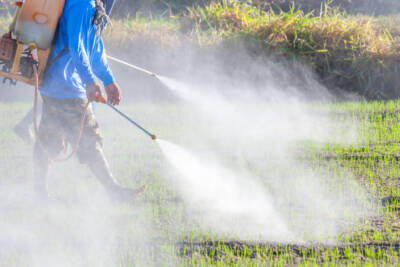Are you or a loved one suffering from Parkinson’s disease after exposure to paraquat? You may have a legal claim.

Paraquat has been linked to serious health effects, including Parkinson’s disease.
Increasing evidence suggests that there is a link between paraquat dichloride (“paraquat”) — a widely-used weedkiller — and serious health conditions, including Parkinson’s disease. Popular herbicides containing paraquat include: Gramoxone, Firestorm, Helmquat, Parazone, Ortho-Paraquat, and others. Individuals who have mixed, loaded, handled, and/or applied paraquat and individuals who have been exposed to spray drift are among those potentially injured by toxic paraquat exposure.
HAVE YOU OR A LOVED ONE BEEN EXPOSED TO PARAQUAT AND LATER DIAGNOSED WITH PARKINSON’S DISEASE? YOU MAY HAVE A LEGAL CLAIM FOR COMPENSATION.
It is critical that you contact our office today for a free, confidential case evaluation. Our nationally recognized team of Consumer and Environmental attorneys is prepared to fight on your behalf.
800-873-5297 (8:30AM – 5:30PM CT Monday through Friday) | paraquatlawsuit@uselaws.com (24/7)
What is Paraquat?
First introduced in the 1960s, paraquat is a weed-killing herbicide used on a wide variety of crops throughout the United States. Paraquat is most commonly available in liquid form. It is applied directly to plants as a spray, and kills green cells upon contact. Paraquat is used to control weeds and to clear fields before crops are planted. The use of paraquat has grown recently, as it has become a popular alternative for another widely-used, and dangerous, herbicide.
 Is Paraquat Dangerous?
Is Paraquat Dangerous?
Yes. Most other developed countries have banned the use of paraquat due to the well-known risks it poses to human health. Drinking one sip of paraquat can be lethal.
Due to its known toxicity, the Environmental Protection Agency (“EPA”) restricted the use of all paraquat products to certified applicators only, prohibiting use by uncertified individuals working under the supervision of certified applicators. As of November 2019, workers must undergo a certification and training process to legally handle and use paraquat. Such restrictions, however, do not prevent toxic exposure. Additionally, many individuals were exposed to paraquat long before these restrictions were put into place.
Schlichter Bogard is accepting clients who were diagnosed with Parkinson’s disease after known exposure to paraquat.
Contact our office today for a free, confidential consultation: paraquatlawsuit@uselaws.com (24/7) | 800-873-5297 (8:30 AM – 5:30 PM CT Monday through Friday).
 The Paraquat-Parkinson’s Link
The Paraquat-Parkinson’s Link
In recent years, mounting evidence has pointed to a less immediately apparent effect of paraquat exposure: Parkinson’s disease. The scientific community has conducted extensive studies on the connection between Parkinson’s disease and paraquat exposure.
In 2009, the American Journal of Epidemiology published a study finding that any exposure to paraquat within 500 meters of a home was associated with increased risk of Parkinson’s onset by 75%.
In 2011, a study published in Environmental Health Perspective found a link between exposure to paraquat and mechanisms associated with the development of Parkinson’s disease.
On July 24th, 2017, the Unified Parkinson’s Advocacy Council sent a letter to the EPA, calling on the agency to impose stricter limits on the use of paraquat. The letter, signed by all members of the council, lists a multitude of studies connecting paraquat exposure and increased risk of Parkinson’s disease.
 What is Parkinson’s Disease?
What is Parkinson’s Disease?
Parkinson’s disease is a neurodegenerative disorder that affects movement. In humans, onset tends to occur in middle to old-age. Tragically, there is currently no known cure or therapy to slow, stop, or reverse the progression of Parkinson’s.
Symptoms of Parkinson’s disease include tremors, slowed movement, muscle stiffness, impaired posture and/or balance, loss of unconscious movements, and changes in speech and/or writing.
The consensus among top scientists is that both genetic and environmental factors impact an individual’s likelihood of developing Parkinson’s. Exposure to toxic pesticides and herbicides — like those containing paraquat — may constitute one such environmental risk.
Do I Qualify?
Schlichter Bogard is currently reviewing claims for paraquat victims nationwide. We are accepting clients who were diagnosed with Parkinson’s disease after a known paraquat exposure.
Individuals who have been exposed to paraquat from long-term use (typically over several years) who develop Parkinson’s disease later in life are the group of persons most likely impacted by the toxins in paraquat. We are evaluating claims involving exposures to paraquat occurring from the 1960s through the present.
Our award-winning team of Consumer and Environmental attorneys are committed to fighting on our clients’ behalf and holding paraquat manufacturers accountable. We take all cases on a contingency fee basis, meaning there is no fee until we win your case.
Don’t delay. Find out if you qualify now.
For a free, confidential consultation, submit a case evaluation request below or contact our office (paraquatlawsuit@uselaws.com).